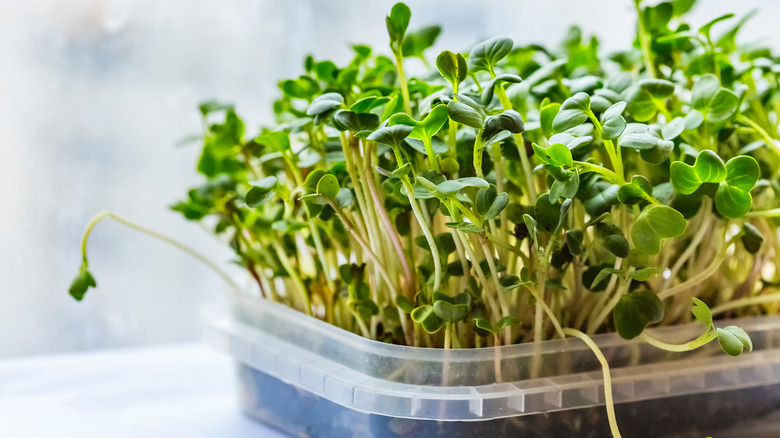The Real Health Benefits Of Microgreens
Microgreens have seen a rise in popularity over the past few years because, for their size, they can really give your diet a boost. Microgreens can be used as a tasty topping on sandwiches and salads to add color and crunch, but what makes them an even greater addition to your meal is the variety of benefits they bring to the table.
These tiny greens are grown from a variety of seeds including broccoli, cauliflower, watercress, arugula, cucumber, basil, and spinach (via Self). Without much trouble or space, you can even make a batch of them at home for yourself.
Nutritional value can vary depending on what type of sprouts they are grown from, but most varieties of microgreens have high amounts of copper, iron, potassium, magnesium, and zinc (via Frontiers in Nutrition). Moreover, studies indicate that the seedlings can have as much as 40 times more nutrition than their mature counterparts (via University of San Diego Health).
Microgreens can help fight disease
Along with loads of vitamins and minerals, microgreens are also packed with much more antioxidants and polyphenols than mature versions of these herbs and vegetables. Antioxidants protect your body against damage done by free radicals, which are linked to a variety of diseases including heart disease (via Mayo Clinic).
In fact, research suggests that the antioxidants and polyphenols found in red cabbage microgreens might lower low-density lipoprotein (LDL) cholesterol and triglycerides (via Medical News Today). In addition, these compounds might also be linked to a lower risk of Alzheimer's disease (via Healthline).
Furthermore, microgreens grown from fenugreek seeds may help reduce the risk of diabetes because they enhance sugar uptake in cells by over 40%. Some evidence even suggests that the polyphenols found in these microgreens might also lower the risk of certain cancers.
With so many benefits, there aren't many reasons not to give microgreens a try.


